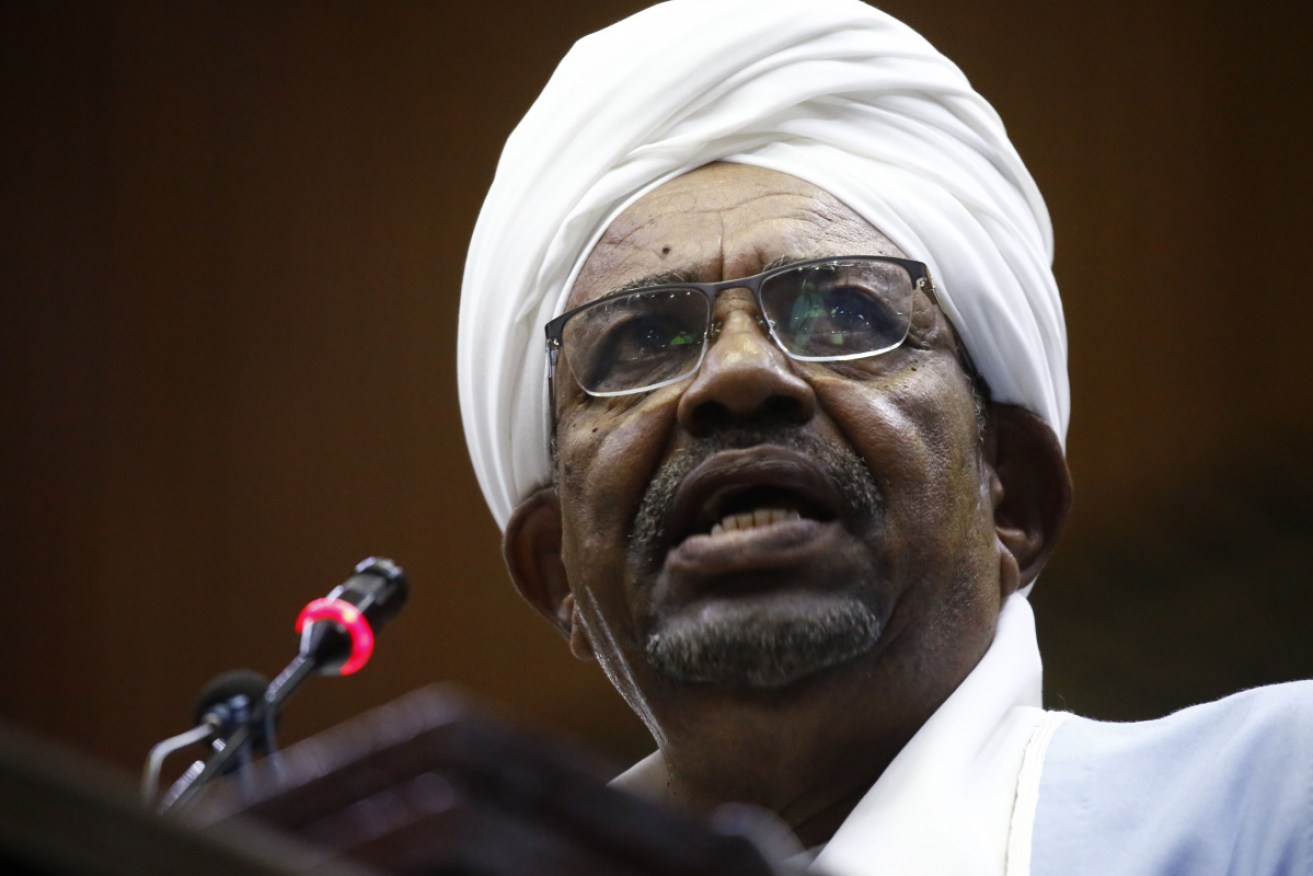Sudan dictator Omar al-Bashir deposed in military coup


Ousted Sudanese President Omar al-Bashir has lost his multi-million dollar cash stash. Photo: Getty
Sudan’s President Omar al-Bashir has been arrested in a military coup after nearly 30 years in power.
Speaking on state television, Sudan Defence Minister Awad Ibn Auf said the army would oversee a two-year transitional period before elections could be held to decide a new leader.
Mr Ouf also announced a three-month state of emergency with the army imposing a night-time curfew as protesters took to the streets to demonstrate against the new ruling military council.
In a statement on Friday morning (Australian time), the army said the curfew will run “from 10:00 pm to 4:00 am and all must adhere to it for their own safety,” adding that it was “doing its duty to keep them and their properties secure”.
Bashir was arrested after months of escalating protests against ruthless, decades-long, rule.
The country’s longtime dictator has been detained in a “safe place”, Mr Auf said, with reports emerging that he is under house arrest.
https://twitter.com/_Atanasi/status/1116256045771440129?ref_src=twsrc%5Etfw%7Ctwcamp%5Etweetembed%7Ctwterm%5E1116256045771440129&ref_url=https%3A%2F%2Fwww.sbs.com.au%2Fnews%2Fsudan-s-army-to-establish-night-time-curfew-after-removing-president
Human Rights Watch has urged Sudanese authorities to execute the 2009 International Criminal Court arrest warrant against Bashir, 75, for crimes against humanity and war crimes.
Bashir has been charged with genocide and faces five counts of crimes against humanity and two counts of war crimes in connection to Sudanese military actions in Darfur.
Seated on a gold-upholstered armchair, Mr Auf announced a three-month state of emergency, a nationwide ceasefire and the suspension of the constitution. He also said Sudan’s air space would be closed for 24 hours and border crossings shut until further notice.
Sudanese sources told Reuters that Bashir was at the presidential residence under “heavy guard”. A son of Sadiq al-Mahdi, the head of the country’s main opposition Umma Party, told al-Hadath TV that Bashir was being held with “a number of leaders of the terrorist Muslim Brotherhood group”.
Bashir has been indicted by The Hague and is facing an arrest warrant over allegations of genocide in Sudan’s Darfur region during an insurgency that began in 2003 and led to the death of an estimated 300,000 people.
The downfall of Bashir follows the toppling this month of Algerian strongman Abdelaziz Bouteflika, also following mass protests after three decades in power.
Thousands of people flocked to an anti-government protest outside the defence ministry on Thursday, while huge crowds took to the streets in central Khartoum.
Demonstrators called for a civilian government and said they would not accept an administration led by military and security figures, or by Bashir’s aides.
Troops deployed around the defence ministry and on major roads and bridges in the capital.
Soldiers stormed the headquarters of Bashir’s Islamic Movement, the main component of the ruling National Congress Party. Protesters also attacked the offices of Sudan’s intelligence and security service in the eastern cities of Port Sudan and Kassala on Thursday, witnesses said.
The security service earlier announced the release of all political prisoners.
Bashir, a former paratrooper who seized power in a bloodless coup in 1989, has been a divisive figure who has managed his way through one internal crisis after another while withstanding attempts by the West to weaken him.
Sudan has suffered prolonged periods of isolation since 1993, when the United States added Bashir’s government to its list of terrorism sponsors for harbouring Islamist militants. Washington followed up with sanctions four years later.
The latest crisis has escalated since the weekend when thousands of demonstrators began camping out outside the defence ministry compound, where Bashir’s residence is located.
Clashes erupted on Tuesday between soldiers trying to protect the protesters and intelligence and security personnel trying to disperse them.
At least 11 people died, including six members of the armed forces, the information minister said, citing a police report.
Since December, Sudan has been rocked by persistent protests sparked by the government’s attempt to raise the price of bread, and an economic crisis that has led to fuel and cash shortages.
-with AAP








